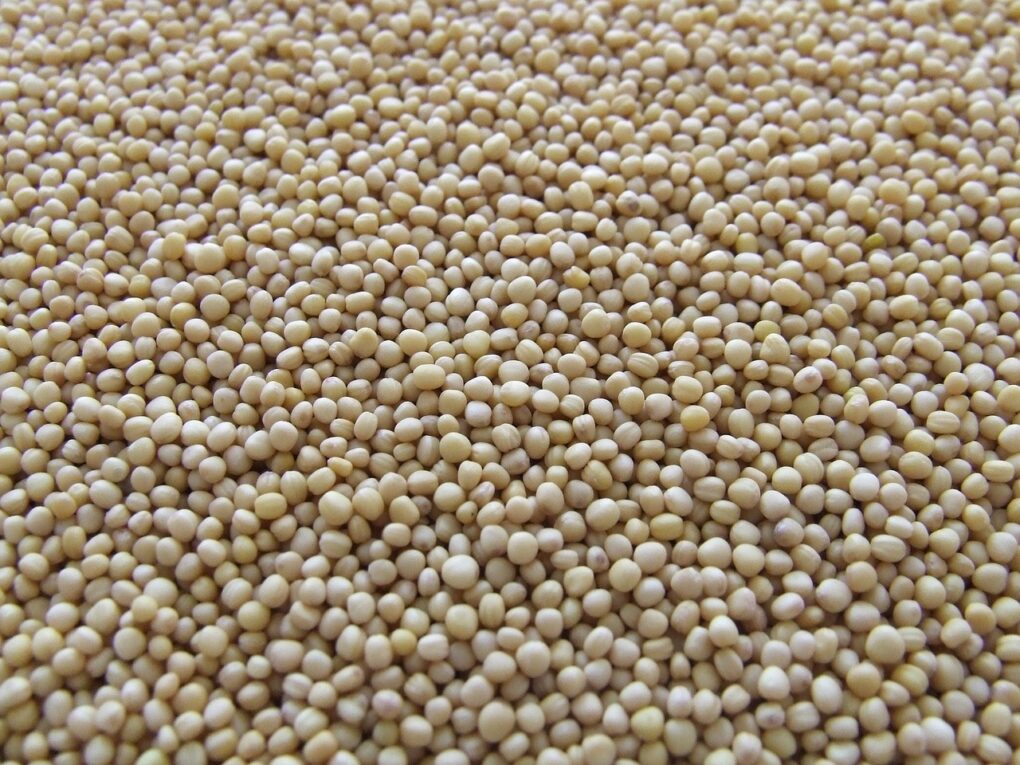Mustard, Brassica juncea, refers to both the plant of the Brassicaceae family and the condiment made from its seeds. The plant produces small seeds that can vary in color, including yellow, brown, and black, depending on the species. Mustard seeds are commonly ground and mixed with liquids such as water, vinegar, or wine to create a paste or sauce with a pungent flavor.
History of the Mustard Plant
Mustard is mentioned in the New Testament of the Bible five times, and referred to as ‘the greatest herb‘. The Mustard plant has been used since Ancient times and is valued for its oil content. Some medicinal mustard compounds date back to at least 400 B.C.
Mustard plants are any of several plant species in the genera Brassica and Sinapis. Mustard plants can be found growing wild in many parts of the World as they are widely cultivated. Mustard is grown in just about every area of North America except the far northern parts, and can grow up to eight feet in height.
Mustard is the second most popular spice traded around the world. Pepper is the first.
Varieties of Mustard
There are many varieties of mustard and they all have very pungent flavors. The Latin name for the mustard plant is Brassica spp, and the word for mustard is “sinapi” or “mustum ardens“. “Mustum ardens” literally translates to “burning must,” reflecting the pungency of mustard. The term “sinapi” is the basis for the modern scientific name for the mustard plant, which is Sinapis alba for white mustard.
Depending on the specific species, Mustard varieties include; Brassica nigra (black mustard), Brassica juncea (brown mustard) or Brassica hirta (white mustard).
Other names for mustard are; white mustard, yellow mustard, pepper grass and hedge mustard.
Culinary Use of Mustard
Mustard is a versatile ingredient in cooking, adding flavor and depth to a wide range of dishes, including salads, sandwiches, marinades, sauces, and dressings. Additionally, its seeds can be used whole, ground, or even sprouted, offering different textures and flavors to culinary creations.
Health Benefits of Mustard Seed
In addition to its culinary uses, mustard has been employed for various purposes throughout history, including as a traditional medicine and as a source of edible oil. It contains compounds like glucosinolates, which are responsible for its characteristic flavor and potential health benefits. These benefits may include antioxidant properties, antimicrobial effects and potential roles in digestive health.
As early as 1699, it was claimed that mustard seed could strengthen the memory, expel heaviness and revive the spirits. Mustard seed was recommended in 1653 for toothaches, joint pain, skin problems and stomach aches. Mustard plasters are used to clear up chest congestion and relieve arthritic and rheumatoid pain and soreness.
Mustard Stimulates the Digestive System
Mustard seed is used to strengthen the digestive system as it can stimulate the flow of gastric juices so to aid with digestion and metabolizing fat in the body as well as encouraging a healthy appetite. While it calms the stomach, it can also act as a laxative.
Mustard has also been used to cure stubborn hiccups. Mustard seed has been used as an emetic (a substance that promotes vomiting) for centuries. It will allow for the elimination of everything in the stomach without depleting the system.
Mustard as a Warming Herb
Since mustard seed is a stimulant, it will warm the circulatory system. This can result in dilated blood vessels. Also, a warmed system can help burn and metabolize fat in the body. As a warming herb, mustard seed will encourage perspiration, helping to lower fevers as well as cleansing the body of toxins. This can help the body fight colds and flu.
Mustard Relieves Muscle Pain
Mustard seed extract can be rubbed on the back to relieve back pain and spasms. It will warm the body when rubbed on sore joints and muscles, thereby providing relief and loosening tightness.
Mustard Plasters
Mustard plasters and poultices are tried and true remedies to relieve arthritic joints, sciatica, neck pain, backache, neuralgia and muscle pain. The mustard plasters work by dilating the blood vessels to promote the increase of blood flow to the surface of the skin. This warms the affected area and removes any toxins from that area.
Poultices and plasters are also used to relieve respiratory infections and helps treat chest congestion, pneumonia, bronchitis and croup.
Mustard Plaster – How To Guide
A mustard plaster is made by using 4 tablespoons of flour, 2 tablespoons dry mustard, and lukewarm water. A paste is made that is easily spread but not too watery.
The most effective way to apply any poultice is to use a flannel and spread the mixture over on half of the flannel and fold the other half to make a package. Apply the poultice to the chest, cover with a heavy blanket to encourage sweating. Do not apply the mustard plaster directly to the skin as it will burn.
The mustard plaster should be left on for up to 20 minutes. If the skin turns bright red, remove the plaster immediately.
Once it has been removed from the chest, wipe the area thoroughly. Then use the same method to apply to the back. A warm shower will be good after the poultice is removed.
Though modern medicine has mostly replaced the use of mustard plasters, those who use them know that it is a great way to draw respiratory toxins from the body in a natural way. The plasters also work on sore muscles, gout, sore backs and poor circulation.
Consumption of Mustard
There are many culinary varieties of Mustard which can be enjoyed as a healthy and tasty condiment.
Ground Mustard seed can be taken as a tea or sprinkled on food. It can also be added to bath water, to help with chest congestion and colds.
If taking as a supplement, the recommended dosage is to take two capsules one time a day with a glass of water, early in the day.
Always take care when taking herbs and Read Our Disclaimer.
Mustard Herb Notes / Side Effects
Mustard is generally safe when consumed in moderate amounts as a condiment or as part of cooked dishes. However, excessive consumption or allergic reactions to mustard can lead to certain side effects in some individuals.
These side effects may include:
Allergic reactions: Some people may be allergic to mustard, experiencing symptoms such as hives, itching, swelling, difficulty breathing, or anaphylaxis.
Gastrointestinal issues: Consuming large amounts of mustard may cause gastrointestinal discomfort such as stomach upset, heartburn, or diarrhea in some individuals.
Skin irritation: Direct contact with mustard oil or mustard seeds may cause skin irritation or allergic reactions in sensitive individuals.
Interaction with medications: Mustard may interact with certain medications or exacerbate existing health conditions in some individuals. It’s advisable to consult with a healthcare professional if you have any concerns about consuming mustard, especially if you have underlying health issues or are taking medications.



Leave a Reply